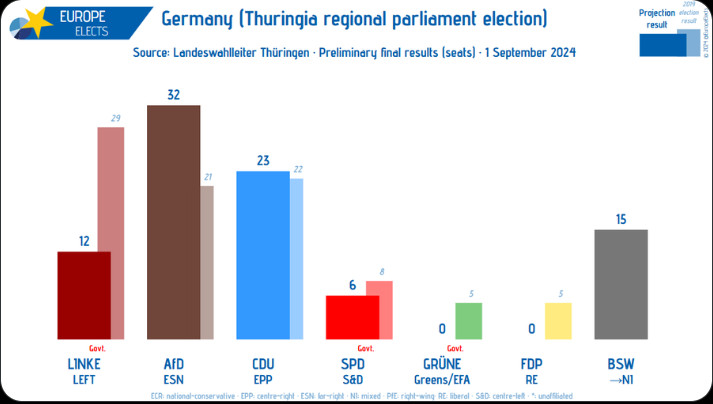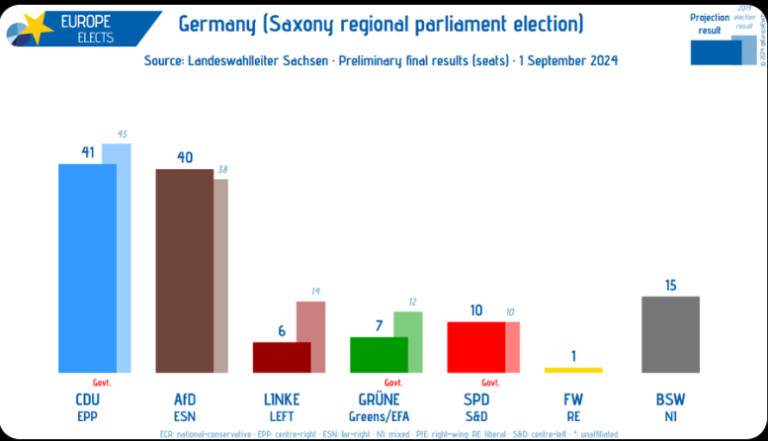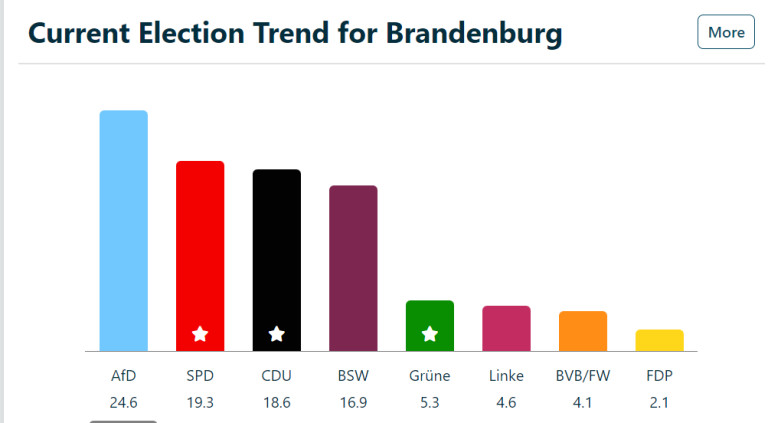By Tom Luongo
September 4, 2024
Nearly as important as the US Presidential elections this year are the state elections in Germany this month. All of the states that have gone or will go to the polls are strongholds for outsider, anti-globalist Alternative for Germany (AfD).
But why would state elections in the former East Germany be so important ?
It's not because populism is popular, though that is an unqualified good thing.
It is because there's much more at stake here than it appears at first glance, due to the vagaries of the German constitution. I'll get to that in a minute.
Yesterday voters in Saxony and Thuringia nearly moved the ruling German coalition in Berlin into panic mode, possibly collapse by following through and voting in record numbers for AfD.
The problem is that it wasn't quite enough to cause a political earthquake by creating definitive results which the German political elite would have to weather. It looks like the demonization campaign of Afd in 2024 was just effective enough to preserve the political status quo in Germany for a little while longer, even if it means unstable coalitions in Saxony and Thuringia.
Brandenburg is on the clock for the 22nd and things are trending badly for the Scholz government in Berlin there as well.
The German political establishment, very much of the Davosian persuasion, knew AfD would do well in these elections. Previous results and extreme machinations in 2019 were needed to keep AfD out of the government in Thuringia. AfD was projecting to win, and did win, there, while in Saxony it would come down to voter turnout as to whether it would beat the Christian Democratic Union (CDU).
They failed by a single point against very high voter turnout, over 73%.
They spent all of 2024 creating scandal after scandal to freeze voters in place, ramping up the "far right" rhetoric to 11 while trotting out every tired canard about their plans to deport everyone and lynch immigrants.
If you think the Democrats' rhetoric surrounding Project 2025 and Der Trumpenfuhrer here in the US is over the top, you seriously don't read German media. It's nearly British in its tenuous relationship with anything resembling the truth.
For ten years now, there has been a cordon sanitaire around AfD, with all of the other parties refusing to form coalitions with them. So the goals for AfD this time were more subtle than just winning the elections. That's good for party building and the future, but sadly, the future of Europe is now.
Because without an outright majority they would never take power, nor was its leadership under any illusions that anything would change if they didn't.
Merkel's Legacy - Globalism's Trifecta of Vetoes
To understand the current situation one has to go back to the 2017-19 election cycle where then Chancellor Angela Merkel pulled every string and called in every marker she had to 1) freeze out AfD and 2) hand an effective majority in the German upper house, the Bundesrat, to the Green Party.
The Bundesrat has 69 seats currently and is made up of caucuses from each of the states in Germany. Seats are apportioned on a population basis to each state with the parties in each state government getting representation in that state's caucus.
So, while AfD garnered 24% of the 2019 vote, if the other parties can cobble together a 51% coalition of the seats in the Thuringian parliament they form a government. Then Thuringia's 4 seats in the Bundesrat are doled out to each party in the coalition. In this case it was the communists from Die Linke, the militant (and Globalist) Greens, and the nominally center-right but equally globalist CDU.
But here's the kicker and the key to understanding why AfD's success this time still wasn't good enough.
States in the Bundesrat vote as a block.
I repeat.
States in the Bundesrat vote as a block.
This means if the Greens control any seat in a state's government they can and will veto anything they disagree with. The same goes for any party with a state caucus majority. And coming into yesterday's elections the Greens effectively controlled 44 of the 69 seats in the Bundesrat. Chancellor Olaf Scholz' Social Democrats (SPD) controlled 42 seats. The other party with veto power is the CDU (43 seats).
So, these three states represent 12 seats and a wipe out of the Greens at the state level in these three elections would remove their veto power. The same would happen for the SPD. I remind you they are the two major parties in the national government.
Let's do some coalition math.

After yesterday's results, the Greens are out in Thuringia. They didn't qualify, getting less than 5%. They squeaked by (I wonder how?!) in Saxony with 5.1%. The SPD got thrashed but still have a shot at being included in either government (see Saxony's results below).
There isn't a workable coalition in Thuringia without AfD, unless Sahra Wagenknecht's party (BSW) and Die Linke (DL) team up with the CDU (47 out of 88 seats). A DL/CDU/SPD coalition falls short of a majority by 4 seats.
But, if the left and right-wing populists find they have more in common than not and grasp the bigger picture then AfD/BSW is the natural choice. That subtracts 4 seats from both the Greens (40 seats) and the SPD (38 seats). However, I sincerely doubt that's possible. The CDU would break with the establishment, if only to admit Merkelism is a failure.
But if the main goal is to restore the beginnings of German sovereignty, whatever they cobble together in Thuringia doesn't matter, because the Greens are out.
Don't expect a solution to this problem until after the Brandenburg elections.
Because, Saxony, is the real problem here.

You should expect the cucked manlets at the CDU to do what they are told by Davos and form whatever coalition they have to. But with today's news that Volkswagen is shuttering a main factory in the country, that's going to put the CDU in a real bind politically. So, is there a air of change in the wind?
The problem is that they need 61 seats. CDU/Green/SPD is 58 seats. Adding DL gets them to 64 seats. So, is Die Linke the kingmaker here? Possibly.
The cleaner coalition is for the CDU/BSW/SPD coalition to form with BSW holding the SPD veto hostage.
AfD did not secure the 41 seats needed to block government appointments requiring a 2/3rds majority, thanks to some after election shenanigans.
With more than a third of the seats, the AfD would have been able to block all decisions requiring a two-thirds majority in future. For example, constitutional judges are elected by parliament with a two-thirds majority. The party had announced its intention to make use of this means as often as possible in order to "drive the government before it".
Moreover, AfD/BSW isn't a majority either (55 seats) like it is in Thuringia. And unless DL's leadership is ready to jump onto the populist bandwagon, which is doubtful because BSW is literally a splinter of DL, then there's no workable coalition for AfD to freeze out the major parties.
I would expect the arm-twisting of CDU leadership to force the SPD and Greens into the government to be epic, similar to what Merkel pulled off in 2019, because if those two parties are out, the SPD loses its veto (34 votes in the Bundesrat), and the Greens are teetering on the same outcome in three weeks in Brandenburg (now down to 36).
If the SPD and the CDU are committed to ending Merkelism and the mess she left, then we can expect a CDU/SPD/BSW coalition to form after some negotiations but not until after Branddenburg votes on the 22nd.

If these polling results hold then another CDU/SPD/BSW mashup is likely, regardless of whether the Greens squeak by with just over 5%.
In all of these outcomes Sahra Wagenknecht holds the key cards and her splitting off from Die Linke becomes the turning point in German electoral politics.
At that point the SPD is weakened but still has their veto intact. The Greens fail to achieve the 35 vote threshold, falling to 32 seats in the Bundesrat. Olaf Scholz will have held onto power and weathered a major political storm. The CDU gets stronger and AfD could enter the German upper house with 4 seats under their control.
TL;DR - It's About the Bonds
In the end, AfD's success opened the door to finally putting the legacy of Angela Merkel to bed. Whether the current government in Berlin survives this is a different discussion for a different day. It's also one I don't think I'm qualified to comment on.
What I will say is that nothing that occurs in Germany will do anything to jeopardize the German bund market, which is the key to keeping the EU itself intact in its current form. The markets didn't react to the histrionic headlines from the media about Nahtsis winning in East Germany, so it's obvious they don't see AfD as the problem.
The Greens are a spent force now, having been thoroughly rebuked by the electorate after leading the country to deindustrialization, social unrest and war in Ukraine.
Now the CDU and SPD can get back to serving their real masters, Germany's industrial giants, which is what I expect is really driving these changes. They have been the biggest losers in this epilogue in the story of Merkelism.
And Christine Lagarde at the ECB, who has spent trillions trying to cap European bond yields, will be forced to say nothing and do less about this. So, while it may look like AfD is getting the shaft here, and they are, they have also opened the door to a fundamental change in direction for Germany, one that walks away from further bankruptcy and collapse.
If I'm Alice Weidel at AfD HQ this morning, I take the win and try to build some bridges.
There is still the strong possibility of the CDU holding its nose and working with them in Thuringia, but only after Saxony and Brandenburg have been resolved. If that happens, we can assume that German foreign and domestic policy will shift quickly away from what the EU Commission is screaming for in Brussels - more war and more fiscal and political integration and more money laundering for all of their bad bets on the outcome.
This is what Alex Krainer and I discussed in detail in episode #190 of the GGnG Podcast. And I suspect there are a lot of unhappy people in City of London right now. But that's for another article.
And if you think I'm over-reaching here in my conclusion, then this note about the EU importing more gas from Russia than the US for the first time since the start of the Ukraine war should make you think twice. Germany needs cheap energy to turn this corner, and who do you think is truly in charge of making that happen? And who do you think was behind them committing ritualistic suicide?
Reprinted with permission from Gold Goats 'n Guns.